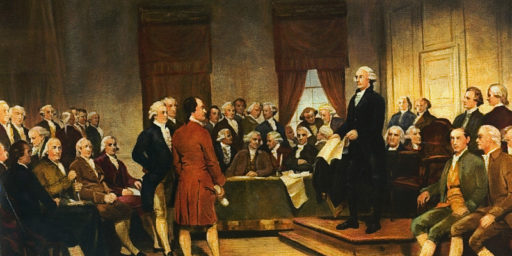Made-up Wikipedia Quote Makes Obituaries
The erstwhile Dr. Leopold Stotch passes along news of the exploits of a fellow Irish prankster:
When Dublin university student Shane Fitzgerald posted a poetic but phony quote on Wikipedia, he said he was testing how our globalized, increasingly Internet-dependent media was upholding accuracy and accountability in an age of instant news.
His report card: Wikipedia passed. Journalism flunked.
The sociology major’s made-up quote — which he added to the Wikipedia page of Maurice Jarre hours after the French composer’s death March 28 — flew straight on to dozens of U.S. blogs and newspaper Web sites in Britain, Australia and India. They used the fabricated material, Fitzgerald said, even though administrators at the free online encyclopedia quickly caught the quote’s lack of attribution and removed it, but not quickly enough to keep some journalists from cutting and pasting it first.
A full month went by and nobody noticed the editorial fraud. So Fitzgerald told several media outlets in an e-mail and the corrections began.
“I was really shocked at the results from the experiment,” Fitzgerald, 22, said Monday in an interview a week after one newspaper at fault, The Guardian of Britain, became the first to admit its obituarist lifted material straight from Wikipedia. “I am 100 percent convinced that if I hadn’t come forward, that quote would have gone down in history as something Maurice Jarre said, instead of something I made up,” he said. “It would have become another example where, once anything is printed enough times in the media without challenge, it becomes fact.”
So far, The Guardian is the only publication to make a public mea culpa, while others have eliminated or amended their online obituaries without any reference to the original version — or in a few cases, still are citing Fitzgerald’s florid prose weeks after he pointed out its true origin. “One could say my life itself has been one long soundtrack,” Fitzgerald’s fake Jarre quote read. “Music was my life, music brought me to life, and music is how I will be remembered long after I leave this life. When I die there will be a final waltz playing in my head that only I can hear.”
Fitzgerald said one of his University College Dublin classes was exploring how quickly information was transmitted around the globe. His private concern was that, under pressure to produce news instantly, media outlets were increasingly relying on Internet sources — none more ubiquitous than the publicly edited Wikipedia.
This was something of a perfect storm: The sudden death of a notable but relatively obscure figure combined with a superbly crafted quote.
Wikipedia spokesman Jay Walsh says, “We always tell people: If you see that quote on Wikipedia, find it somewhere else too.” That’s generally been my practice. Trouble is, once a quote is out there, it quickly loses its Wikipedia moorings. My guess is that many of those who used the quote found it at The Guardian or elsewhere. Yes, journalists use Wikipedia without attribution. Even more lift quotes and story ideas from other journalists, with or without attribution.
I’ve been quoted or asked for interviews many times based on blog posts that were mostly excerpts of media stories or others’ blog posts. Given the formatting of this site — which has long used very well marked blockquotes and which highlights the name of the source being quoted — that would seem rather obvious. But those searching for information stumble on the site via Google search, where we tend to rank well, and see an authoritative byline and go with it.
Similarly, the Atlantic Council put out a report on Afghanistan in January 2008 which began, “Make no mistake: NATO is not winning in Afghanistan.” A subsequent edition of the report two months later changed that to, “Make no mistake: The international community is not winning in Afghanistan.” It has thus been more than a year since the original quote appeared on the Council website or was available in a fresh print copy. I still see the original version with some frequency. It’s the quote that’s being quoted, not the report.
Indeed, were this report on the fake quote written differently, I’d expect that people would have used this report of the fake quote — and reports on the reports on the fake quote like this one — as a source of the quote. I’m not sure whether AP’s Shawn Pogatchnik, whose report I quote above, intentionally broke up the fake quote with the phrase “Fitzgerald’s fake Jarre quote read” to forestall that happening or it’s a happy accident. I have had enough blog comments and emails resulting from blog posts to know that quite a few people will mistake, say, a commentary about Jesse Jackson as a posting by Jesse Jackson. People doing Internet searches will glom onto a single sentence and ignore everything else on the page.






Speaking of Wiki, over at the Volokh Conspiracy, there’s a posting by one Ira Matetsky, who says of himself, “I’ve contributed to Wikipedia myself, and I’m an administrator on the site and a member of the in-house Arbitration Committee.” The title of his posting is Some First Thoughts on Wikipedia.
Good thing that our brains are becoming indices rather than depositories of knowledge, huh?
It’s useful to have facts as well as an index, obviously. But quotes from dead poets weren’t likely to have made the collection even in the pre-Internet days. It’s certainly easier for me to find this sort of info now than it was a decade ago.
I doubt fake quotes are anything new. The only difference now is the speed of distribution. In my opinion, the benefits of the Internet outweigh the disadvantages, and I have confidence people are flexible enough to adapt.
I wonder if there is a way to model a news service on a pseudo-wiki concept?
Just brain storming here.
Exclusives wouldn’t work. You’d need to have events reported on by multiple people (to give sourcing). Then you’d have to have people voluntarily hashing out the events and editing things, just as with wikipedia.
Hrrrm. I’m not sure how you could motivate people to be independent reporters without giving them an incentive to cheat.
That’s similar to early sentiments of people about Wikipedia. Solution:
For a first-run experiment of the kind you suggest (but involving major news sources), see Wikipedia’s version. It would be an interesting twist to have multiple free-range, volunteer sources and compile data based on that as well — though the effort would be significant unless that data were specifically provided to the central news-taking site. This sounds like fun, though.
But the personal investment required to sit at a computer and edit a wiki page is a lot less than that of going out and tracking down a story.
The erstwhile Dr. Leopold Stotch
Hee hee.